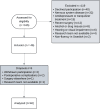Understanding neurocognitive recovery in older adults after total hip arthroplasty-neurocognitive assessment, blood biomarkers and patient experiences: a mixed-methods study
- PMID: 39880425
- PMCID: PMC11781142
- DOI: 10.1136/bmjopen-2024-093872
Understanding neurocognitive recovery in older adults after total hip arthroplasty-neurocognitive assessment, blood biomarkers and patient experiences: a mixed-methods study
Abstract
Objective: Delayed neurocognitive recovery, previously known as postoperative cognitive dysfunction, is a common complication affecting older adults after surgery. This study aims to address the knowledge gap in postoperative neurocognitive recovery by exploring the relationship between subjective experiences, performance-based measurements, and blood biomarkers.
Design: Mixed-methods study with a convergent parallel (QUAL+quan) design.
Setting and participants: The study reports results from 40 older adult patients (52.5% women; mean age 73, SD 6.7) scheduled for total hip arthroplasty at a hospital in Sweden.
Outcome measures: Neurocognitive performance was assessed using a standardised test battery, neuroinflammation through blood biomarker analysis and postoperative neurocognitive recovery via semistructured interviews and the Swedish Quality of Recovery questionnaire.
Results: Five patients were classified as having delayed neurocognitive recovery based on performance tests. Qualitative data revealed that most patients reported cognitive symptoms, particularly related to executive functions and fatigue. Psychological factors, including a sense of agency and low mood, significantly influenced cognitive recovery and daily functioning. Elevated inflammatory blood biomarkers were not detected pre- or postoperatively in patients with delayed neurocognitive recovery. The global postoperative recovery score was 40.9, indicating a low quality of recovery.
Conclusion: Many patients reported subjective cognitive decline that was not corroborated by delayed neurocognitive recovery in the performance-based tests. Psychological factors were influential for neurocognitive recovery and should be routinely assessed. Future research should incorporate longitudinal follow-ups with performance-based measurements, fatigue assessment, evaluations of instrumental activities of daily living and subjective reporting, supported by a multidisciplinary team approach.
Trial registration number: NCT05361460.
Keywords: NEUROLOGY; ORTHOPAEDIC & TRAUMA SURGERY; Old age psychiatry.
© Author(s) (or their employer(s)) 2025. Re-use permitted under CC BY. Published by BMJ Group.
Similar articles
-
Association between cerebrospinal fluid biomarkers of neuronal injury or amyloidosis and cognitive decline after major surgery.Br J Anaesth. 2021 Feb;126(2):467-476. doi: 10.1016/j.bja.2020.09.043. Epub 2020 Nov 9. Br J Anaesth. 2021. PMID: 33183737
-
Patients' experiences of early postoperative cognition and its relation to cognitive decline and inflammatory responses: a protocol for a mixed-methods study.BMJ Open. 2019 Dec 15;9(12):e032650. doi: 10.1136/bmjopen-2019-032650. BMJ Open. 2019. PMID: 31843843 Free PMC article.
-
Usability and feasibility of a digital cognitive screening tool measuring older adults' early postoperative neurocognitive recovery: a protocol for a pilot study.BMJ Open. 2023 Jul 21;13(7):e070404. doi: 10.1136/bmjopen-2022-070404. BMJ Open. 2023. PMID: 37479514 Free PMC article.
-
Folic acid supplementation and malaria susceptibility and severity among people taking antifolate antimalarial drugs in endemic areas.Cochrane Database Syst Rev. 2022 Feb 1;2(2022):CD014217. doi: 10.1002/14651858.CD014217. Cochrane Database Syst Rev. 2022. PMID: 36321557 Free PMC article.
-
Postoperative cognitive dysfunction in elderly patients undergoing hip arthroplasty.Psychogeriatrics. 2020 Jul;20(4):501-509. doi: 10.1111/psyg.12516. Epub 2020 Jan 24. Psychogeriatrics. 2020. PMID: 31976614
Cited by
-
Exploring cognitive function and postoperative neurocognitive recovery after cardiac surgery in older adults (ECPON): a protocol for an observational study.BMJ Open. 2025 Jun 22;15(6):e098208. doi: 10.1136/bmjopen-2024-098208. BMJ Open. 2025. PMID: 40545303 Free PMC article.
-
The bumpy road to recovery: older adults' experiences during the first year after hip replacement surgery - a longitudinal qualitative study.BMC Geriatr. 2025 Jul 2;25(1):483. doi: 10.1186/s12877-025-06155-6. BMC Geriatr. 2025. PMID: 40604590 Free PMC article.
References
Publication types
MeSH terms
Substances
Associated data
LinkOut - more resources
Full Text Sources
Medical
Miscellaneous

